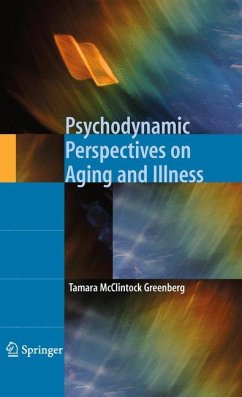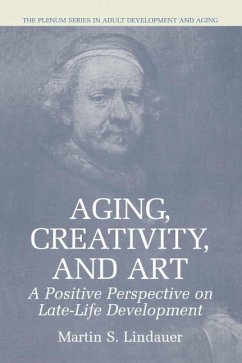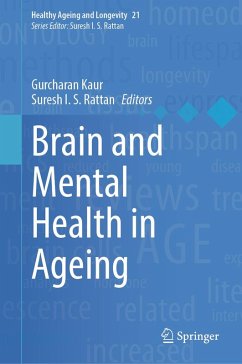
Psychodynamic Perspectives on Aging and Illness (eBook, PDF)
Versandkostenfrei!
Sofort per Download lieferbar
40,95 €
inkl. MwSt.
Weitere Ausgaben:

PAYBACK Punkte
20 °P sammeln!
Endorsements:"The Second Edition of Psychodynamic Perspectives on Aging and Illness is a timely and superb revision which offers health-care professionals working at the mind/body interface a paradigm shift. For far too long, the wisdom of psychoanalysis as a tool to understand the suffering inherent in aging and illness has been devalued and neglected. With this update, Dr. Greenberg incontrovertibly corrects this lapse. Her integration of current scientific research, alongside a user-friendly discussion of the theory and practice of psychodynamic psychotherapy, is an important contribution t...
Endorsements:
"The Second Edition of Psychodynamic Perspectives on Aging and Illness is a timely and superb revision which offers health-care professionals working at the mind/body interface a paradigm shift. For far too long, the wisdom of psychoanalysis as a tool to understand the suffering inherent in aging and illness has been devalued and neglected. With this update, Dr. Greenberg incontrovertibly corrects this lapse. Her integration of current scientific research, alongside a user-friendly discussion of the theory and practice of psychodynamic psychotherapy, is an important contribution to the psychology of medicine. Several topics are elaborated; the constructs of hysteria and somatization, the biology of stress, the impact of attachment history on coping with sickness as well as the experiences of trauma and grief. As with the first edition, the idea that the patient's experience of illness cannot be understood without including the subjectivity of the practitioner who provides care is considered and done so with more awareness of this complexity. Each chapter now contains a section on "Suggested Techniques" that succinctly presents a guideline for applying the ideas set forth. Other no table aspects of the book are its reflections on the culture of medicine and the insights about the influences of contemporary Western life on the manifestation and adjustment to illness. This edition is, above all, essential for those practitioners dedicated to providing collaborative and interdisciplinary health-care which is both biologically and psychologically informed. As with the First Edition, it will continue to be required reading."
Marilyn S. Jacobs, Ph.D., ABPP, David Geffen School of Medicine at UCLA
"A wonderful, well-researched, and important book that proves to be as much about humanity and resilience as it is about human psychology." Lee Daniel Kravetz Author of Supersurvivors: The surprising Link Between Suffering & Success
"Tamara McClintock Greenberg is one of the leading health psychologists of our time. In this second edition of her classic text, she corrects the much overlooked interface between the psychodynamics of aging, illness, and the doctor-patient relationship offering insights that no other practitioner or theorist has accomplished to date. Combining her training and expertise in psychology and behavioural medicine, she facilely navigates the turbid waters of how medical illness and aging is informed by unconscious dynamics, childhood familial relations, somatisation, coping and recovery, and the convergence of mind and body. Healthcare practitioners of all types who work therapeutically with chronically ill and older adults will find this to be a perspicacious and indispensible approach to clinical praxis."
Jon Mills, PsyD, PhD, C.Psych., ABPP, Professor of Psychology &Psychoanalysis, Adler Graduate Professional School, Toronto
"In the second edition of Psychodynamic Perspectives on Aging and Illness Dr Tamara Greenberg makes a remarkable contribution to those who treat patients with medical illnesses as they age. Her psychodynamically informed approach to patients in later life couldn't come at a better time as our population becomes older. Challenging the field's dogma that older patients are too set-in-their-ways to make personality changes, Dr Greenberg demonstrates in this book how wrong that notion was. We are all a work in-progress until the very end. This is a must-read practical book for therapists, nurses, families, physicians, family and estate lawyers, and health care navigators."
Louann Brizendine, M.D., Professor and Author of "The Female Brain" and "The Male Brain" , Lynne and Marc Benioff Endowed Professor of Clinical Psychiatry, Founder/ Women's Mood and Hormone Clinic, UCSF Universityof California, San Francisco
This timely update of the bedrock text reflects what we now know-and are still finding out-about the benefits of psychodynamic psychotherapy for older adults facing chronic conditions. Expanding on the original, the author balances the physical and experiential factors affecting patients' physical illnesses and related emotional distress while situating core psychodynamic constructs in the context of illness and aging. Special attention is paid to technique, giving therapists practical guidance on dealing with transference and countertransference issues, working with patients in cognitive decline, and navigating complexities of age, class, and culture. The book also reviews the current evidence on how and why psychodynamic therapy helps medical patients with coping, adapting, and healing.
Included in the coverage:
Narcissistic aspects of aging and illness. Grey areas: when illness may be particularly impacted by psychological variables. Cognitive changes and implications for the therapeutic encounter. The influence of psychological factors and relationships on medical illness. Hope and grief: the introduction of an emotional language. The Second Edition of Psychodynamic Perspectives
on Aging and Illness skillfully follows its predecessor as a powerful, plain-spoken mentor to therapists working in hospitals, long-term care facilities, and outpatient practice.
"The Second Edition of Psychodynamic Perspectives on Aging and Illness is a timely and superb revision which offers health-care professionals working at the mind/body interface a paradigm shift. For far too long, the wisdom of psychoanalysis as a tool to understand the suffering inherent in aging and illness has been devalued and neglected. With this update, Dr. Greenberg incontrovertibly corrects this lapse. Her integration of current scientific research, alongside a user-friendly discussion of the theory and practice of psychodynamic psychotherapy, is an important contribution to the psychology of medicine. Several topics are elaborated; the constructs of hysteria and somatization, the biology of stress, the impact of attachment history on coping with sickness as well as the experiences of trauma and grief. As with the first edition, the idea that the patient's experience of illness cannot be understood without including the subjectivity of the practitioner who provides care is considered and done so with more awareness of this complexity. Each chapter now contains a section on "Suggested Techniques" that succinctly presents a guideline for applying the ideas set forth. Other no table aspects of the book are its reflections on the culture of medicine and the insights about the influences of contemporary Western life on the manifestation and adjustment to illness. This edition is, above all, essential for those practitioners dedicated to providing collaborative and interdisciplinary health-care which is both biologically and psychologically informed. As with the First Edition, it will continue to be required reading."
Marilyn S. Jacobs, Ph.D., ABPP, David Geffen School of Medicine at UCLA
"A wonderful, well-researched, and important book that proves to be as much about humanity and resilience as it is about human psychology." Lee Daniel Kravetz Author of Supersurvivors: The surprising Link Between Suffering & Success
"Tamara McClintock Greenberg is one of the leading health psychologists of our time. In this second edition of her classic text, she corrects the much overlooked interface between the psychodynamics of aging, illness, and the doctor-patient relationship offering insights that no other practitioner or theorist has accomplished to date. Combining her training and expertise in psychology and behavioural medicine, she facilely navigates the turbid waters of how medical illness and aging is informed by unconscious dynamics, childhood familial relations, somatisation, coping and recovery, and the convergence of mind and body. Healthcare practitioners of all types who work therapeutically with chronically ill and older adults will find this to be a perspicacious and indispensible approach to clinical praxis."
Jon Mills, PsyD, PhD, C.Psych., ABPP, Professor of Psychology &Psychoanalysis, Adler Graduate Professional School, Toronto
"In the second edition of Psychodynamic Perspectives on Aging and Illness Dr Tamara Greenberg makes a remarkable contribution to those who treat patients with medical illnesses as they age. Her psychodynamically informed approach to patients in later life couldn't come at a better time as our population becomes older. Challenging the field's dogma that older patients are too set-in-their-ways to make personality changes, Dr Greenberg demonstrates in this book how wrong that notion was. We are all a work in-progress until the very end. This is a must-read practical book for therapists, nurses, families, physicians, family and estate lawyers, and health care navigators."
Louann Brizendine, M.D., Professor and Author of "The Female Brain" and "The Male Brain" , Lynne and Marc Benioff Endowed Professor of Clinical Psychiatry, Founder/ Women's Mood and Hormone Clinic, UCSF Universityof California, San Francisco
This timely update of the bedrock text reflects what we now know-and are still finding out-about the benefits of psychodynamic psychotherapy for older adults facing chronic conditions. Expanding on the original, the author balances the physical and experiential factors affecting patients' physical illnesses and related emotional distress while situating core psychodynamic constructs in the context of illness and aging. Special attention is paid to technique, giving therapists practical guidance on dealing with transference and countertransference issues, working with patients in cognitive decline, and navigating complexities of age, class, and culture. The book also reviews the current evidence on how and why psychodynamic therapy helps medical patients with coping, adapting, and healing.
Included in the coverage:
- Technology, idealization, and unconscious dynamics in the culture of medicine.
on Aging and Illness skillfully follows its predecessor as a powerful, plain-spoken mentor to therapists working in hospitals, long-term care facilities, and outpatient practice.
Dieser Download kann aus rechtlichen Gründen nur mit Rechnungsadresse in A, B, BG, CY, CZ, D, DK, EW, E, FIN, F, GR, HR, H, IRL, I, LT, L, LR, M, NL, PL, P, R, S, SLO, SK ausgeliefert werden.












